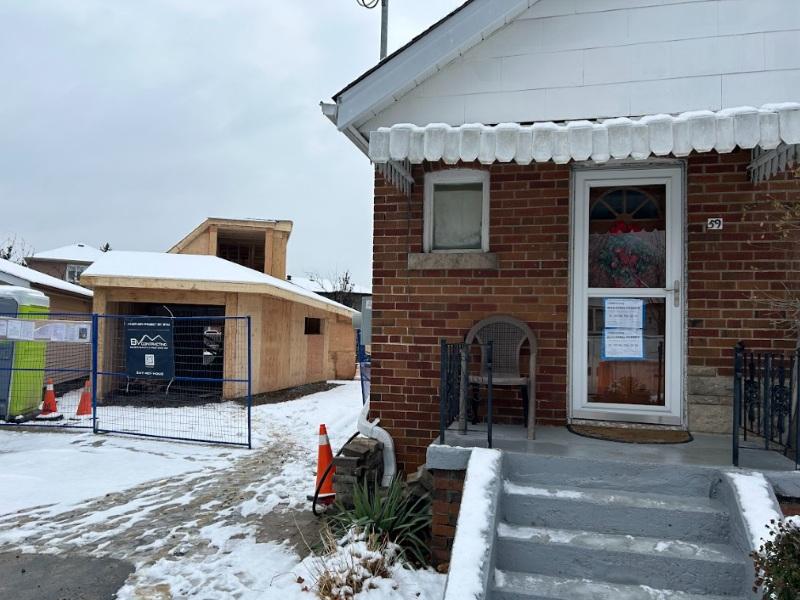
Ten per cent of Canada’s housing is uninsurable for overland floods, the Intact Centre says in its latest report, sounding the alarm for municipalities and the housing industry to take preventive steps.
In A Flood Risk Check-Up For Canadian Municipalities: Tackling Flooding Together, the University of Waterloo-based organization cites research that found residential flooding in Canada costs $2.9 billion per year. The costs of catastrophic insured losses in the country rose between 1983 and 2023, driven largely by water-related damage.
Almost 90 per cent of that is concentrated in the 10 per cent of housing considered to be at the highest risk.
Flooding is not just an environmental problem, but a “key impactor on finance and health,” according to Joanna Eyquem, a managing director at the Intact Centre and co-author of the report, who spoke to RENX Homes in an interview.
The resale value of housing in communities exposed to flooding is an average of 8.2 per cent lower compared to an unaffected neighbourhood, the report states. Also, the number of houses for sale is cut by 44.3 per cent and they require an average of 20 per cent more days on the market to sell.
Such figures may be conservative estimates, she said, meaning the impacts could be higher.
To guide governments and private industry through flood risk and raise awareness of existing standards, the Intact Centre published a questionnaire called the Municipal Flood Risk Check-Up.
The flood risk check-up tool
Consisting of 50 questions, the first section examines flood hazards such as intense rainfall or river and coastal flooding. The second half focuses on the vulnerabilities and level of flood preparation within a municipality.
The questions include:
- “How would you categorize the occurrence of flooding according to historical records?”
- “How would you categorize the presence of basements and occurrence of basement flooding in the past 10 years?”; and
- whether the municipality has developed a climate adaptation plan that includes specific actions to reduce relevant flood risks.
Recommended solutions emphasizing ‘green’ adaptations such as keeping housing out of flood plains with effective land-use planning and nature-based solutions, combined with engineering solutions.
The results are calculated into scores for flood exposure and preparedness, giving users an idea where they stand and where they can improve.
Key to the check-up is its ease of use, Eyquem said; it includes a glossary and supporting information to aid users.
“There was a strong message that the tool should be able to be picked up by anybody and they understand what they’re talking about,” she said, especially smaller municipalities that often lack the resources for intensive studies and efforts to mitigate flood risk.
Such a tool is intended to be valued by municipalities, the private sector and homeowners.
Eyquem urges municipalities to cooperate with organizations that play a role in flood risk management, such as insurers and homebuilders.
The check-up is an opportunity for developers to “understand what needs to happen in flood risk and then maybe modify some of their practices, or at least have a dialogue with municipalities as how we can factor-in these into new developments so new housing is climate resilient,” she said.
The Intact Centre hopes to hear feedback on the check-up and will continue to update the tool, Eyquem said.
More needed on climate resilience
Few Canadians will be left untouched by flood risk, the report states. About 80 per cent of Canadian cities are located wholly or in part in flood zones, according to research, but few municipalities are adapting.
The Intact Centre ran a survey on climate adaptation covering 2015 and 2019-20, and graded the flood preparedness of 16 major Canadian cities as C-plus.
Canadian homeowners are losing insurance coverage due to extreme weather events, according to CBC News. Desjardins ceased offering mortgages to high-risk flood zones in Quebec.
While steps are being taken by municipalities, and the Canadian government is putting hundreds of millions of dollars into programs like the Green Municipal Fund and the Disaster Mitigation and Adaptation Fund, more needs to be done, Eyquem said.
“We spent a lot of time on greenhouse gas emission reduction and that’s really important, but at the same time we need to be adapting to risks that are already baked into our future and we haven’t paid enough attention to that.”
She expressed disappointment the latest federal budget did not offer much in climate resilient housing.
If a homeowner wants to take steps now, Eyquem recommends simple actions such as clearing storm drains. Commercial building owners can provide guidance on flood risk or work with municipalities to manage watersheds, she added.










